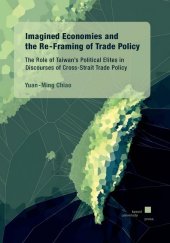 Neuerscheinungen 2017Stand: 2020-02-01 |
Schnellsuche
ISBN/Stichwort/Autor
|
Herderstraße 10
10625 Berlin
Tel.: 030 315 714 16
Fax 030 315 714 14
info@buchspektrum.de |

Yuan-Ming Chiao
Imagined Economies and the Re-Framing of Trade Policy:
The Role of Taiwan´s Political Elites in Discourses of Cross-Strait Trade Policy
2017. 223 S. 21 cm
Verlag/Jahr: KASSEL UNIVERSITY PRESS 2017
ISBN: 3-7376-0358-8 (3737603588)
Neue ISBN: 978-3-7376-0358-4 (9783737603584)
Preis und Lieferzeit: Bitte klicken
In 2010, Taiwan and China concluded a landmark trade agreement: the Economic Cooperation Framework Agreement (ECFA) that sought to pave the way for closer commercial ties by lowering tariffs on several trade items. Just a decade earlier, both sides of the Taiwan Strait were ratcheting up rhetoric that seemed to point to growing political uncertainty across a region once a hotspot during the Cold War. What was behind this political sea change?
The paradox of state policy in the cross-Strait political economy over the past three decades is that despite increased economic activity between both sides, national identity remains an important barometer in framing the prospects and limits of policymaking. In accounting for this paradox and how actors have dealt with it through problem definition and trade policy adjustment, this research utilizes economic imaginaries, a discursive field that shapes the conceptualization of economic life. As discourse and structure are dialectical in relation to one another, an economic imaginary represents an analytical concept to map out ideational shifts concerning economic life and national identity. Specifically, the author aims to address the following questions with the regard to the reconceptualization of cross-Strait commerce in Taiwan government policy:
- What ideas and practices are selected and drawn upon by political elites in Taiwan to create new economic imaginaries?
- How are these ideas being negotiated and resisted in rebuilding of social relations?
- What are the areas of unevenness and contradictions within the discursive process?
This research utilizes a combined methodological approach toward navigating economic imaginaries, including critical discourse analysis, analysis of collective action frames and the critical junctures that challenge their hegemonic power. Drawing upon expert interviews, key policy texts from political and intellectual elites, critical discourse analysis demonstrates the linkage between imaginaries and framing actions by revealing the cognitive mapping of the cross-Strait political economy, the dominant discourses that inform them and the ways in which hegemonic ideas are reproduced within the discourse.
Key Terms: Taiwan; cross-Strait relations; imaginaries; discourse; trade policy; critical discourse analysis; framing;ECFA


